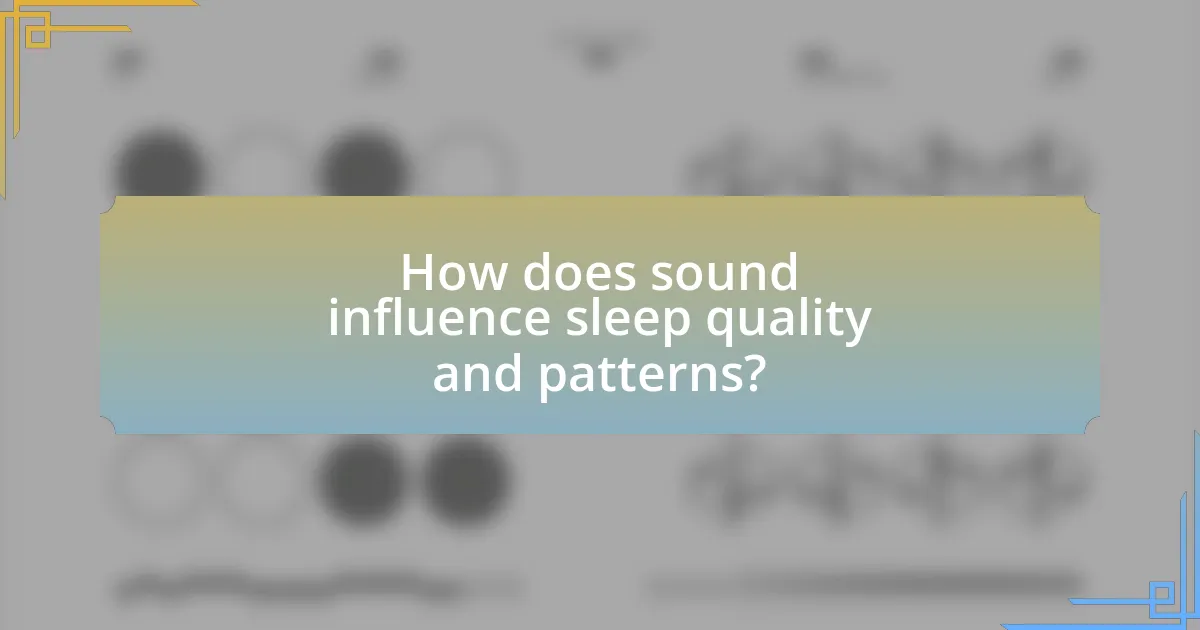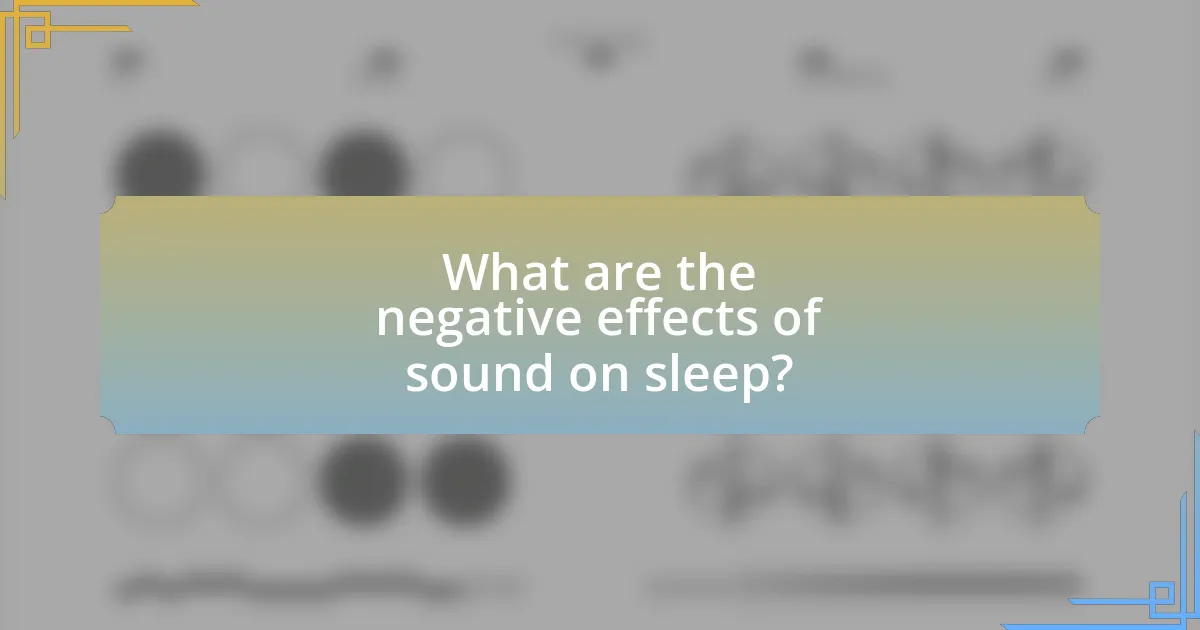The article examines how sound influences sleep quality and patterns, highlighting the significant impact of various auditory stimuli on the ability to fall and stay asleep. It discusses the benefits of white noise and nature sounds in promoting relaxation and masking disruptive noises, as well as the negative effects of loud or irregular sounds on sleep quality. The article further explores the relationship between sound and different sleep stages, including REM sleep, and provides practical strategies for optimizing sound environments to enhance sleep quality. Additionally, it addresses sound sensitivity and its potential to lead to sleep disorders, offering solutions for mitigating sound-related sleep issues.

How does sound influence sleep quality and patterns?
Sound significantly influences sleep quality and patterns by affecting the ability to fall asleep and stay asleep. Research indicates that exposure to certain sounds, such as white noise or calming music, can enhance sleep by masking disruptive noises and promoting relaxation. For instance, a study published in the Journal of Clinical Sleep Medicine found that participants exposed to white noise experienced improved sleep efficiency and reduced awakenings compared to those in a quiet environment. Conversely, loud or irregular sounds, such as traffic or loud conversations, can lead to fragmented sleep and increased awakenings, negatively impacting overall sleep quality. Thus, the type and volume of sound play crucial roles in determining sleep outcomes.
What types of sounds are most impactful on sleep?
White noise and nature sounds are the types of sounds most impactful on sleep. White noise creates a consistent auditory backdrop that masks disruptive noises, helping individuals fall asleep faster and stay asleep longer. Research published in the journal “Sleep Medicine” indicates that white noise can improve sleep quality by reducing sleep onset latency and nighttime awakenings. Nature sounds, such as rain or ocean waves, have been shown to promote relaxation and lower stress levels, which are conducive to better sleep. A study in “The Journal of Advanced Nursing” found that participants exposed to nature sounds reported improved sleep quality and reduced anxiety.
How do natural sounds affect sleep quality?
Natural sounds positively affect sleep quality by promoting relaxation and reducing stress. Research indicates that sounds such as rain, ocean waves, and chirping birds can lower heart rates and enhance feelings of tranquility, which are conducive to falling asleep. A study published in the journal “Sleep” found that participants exposed to natural sounds experienced longer sleep duration and improved sleep efficiency compared to those in silence or with artificial noise. This evidence supports the conclusion that natural sounds can significantly enhance overall sleep quality.
What role do artificial sounds play in sleep patterns?
Artificial sounds can significantly influence sleep patterns by either promoting relaxation or causing disturbances. Research indicates that white noise, for example, can mask disruptive environmental sounds, leading to improved sleep quality and longer sleep duration. A study published in the Journal of Clinical Sleep Medicine found that participants exposed to white noise experienced a 38% increase in sleep efficiency compared to those in a quiet environment. Conversely, certain artificial sounds, such as loud or irregular noises, can disrupt sleep cycles and lead to fragmented sleep. Thus, the role of artificial sounds in sleep patterns is dual-faceted, with the potential to enhance or impair sleep quality depending on their nature and volume.
Why is sound important for sleep regulation?
Sound is important for sleep regulation because it influences the body’s circadian rhythms and can either promote relaxation or cause disturbances. Research indicates that consistent, soothing sounds, such as white noise or nature sounds, can mask disruptive noises and create a calming environment conducive to sleep. For instance, a study published in the journal “Sleep” found that participants exposed to white noise experienced improved sleep quality and reduced awakenings compared to those in quieter environments. This demonstrates that sound plays a critical role in facilitating deeper sleep and maintaining overall sleep patterns.
How does sound affect the sleep cycle?
Sound significantly affects the sleep cycle by influencing the duration and quality of sleep. Research indicates that exposure to noise can disrupt sleep stages, particularly REM sleep, which is crucial for cognitive functions and emotional regulation. For instance, a study published in the journal “Sleep” found that individuals exposed to consistent noise levels experienced reduced sleep efficiency and increased awakenings during the night. Additionally, sounds such as white noise can help mask disruptive environmental noises, promoting deeper sleep by creating a more stable auditory environment.
What is the relationship between sound and REM sleep?
Sound can significantly influence REM sleep by affecting the brain’s activity and the overall sleep cycle. During REM sleep, the brain is highly active, resembling wakefulness, and external sounds can either disrupt or enhance this stage. Research indicates that certain sounds, such as white noise or calming music, can promote deeper sleep and facilitate transitions into REM sleep, while loud or jarring noises can lead to awakenings and fragmented sleep patterns. A study published in the journal “Sleep” by researchers at the University of California, Berkeley, found that exposure to pleasant sounds during sleep can enhance memory consolidation, which is often associated with REM sleep. This evidence underscores the complex relationship between sound and REM sleep, highlighting how auditory stimuli can either support or hinder sleep quality.
How can sound improve sleep quality?
Sound can improve sleep quality by promoting relaxation and masking disruptive noises. Research indicates that soothing sounds, such as white noise or nature sounds, can create a calming environment that helps individuals fall asleep faster and stay asleep longer. A study published in the Journal of Clinical Sleep Medicine found that participants exposed to white noise experienced a significant reduction in sleep onset latency and an increase in total sleep time compared to those in a quiet environment. This evidence supports the idea that sound can effectively enhance sleep quality by reducing disturbances and fostering a more restful atmosphere.
What are the benefits of using white noise for sleep?
Using white noise for sleep can significantly enhance sleep quality by masking disruptive sounds and creating a consistent auditory environment. This masking effect helps individuals fall asleep faster and stay asleep longer, as it reduces the likelihood of being awakened by sudden noises. Research published in the Journal of Clinical Sleep Medicine indicates that white noise can improve sleep efficiency and decrease sleep onset latency, particularly in environments with unpredictable noise levels. Additionally, a study by the National Sleep Foundation found that participants exposed to white noise reported better overall sleep satisfaction compared to those in quieter settings.
How do sleep sounds contribute to relaxation and stress reduction?
Sleep sounds contribute to relaxation and stress reduction by creating a calming auditory environment that promotes a sense of tranquility. These sounds, such as white noise, nature sounds, or soft music, can mask disruptive noises and lower anxiety levels, facilitating a smoother transition into sleep. Research indicates that exposure to soothing sounds can decrease cortisol levels, the hormone associated with stress, thereby enhancing overall relaxation. A study published in the journal “Sleep” by the American Academy of Sleep Medicine found that participants who listened to calming sounds experienced improved sleep quality and reduced stress compared to those who slept in silence.

What are the negative effects of sound on sleep?
Sound negatively affects sleep by disrupting sleep cycles, increasing wakefulness, and reducing overall sleep quality. Research indicates that exposure to noise during sleep can lead to fragmented sleep patterns, which may result in decreased restorative sleep stages, such as deep sleep and REM sleep. A study published in the journal “Sleep” found that individuals exposed to consistent noise levels above 30 decibels experienced significant disturbances in their sleep architecture, leading to increased awakenings and reduced sleep efficiency. Additionally, chronic exposure to loud sounds can elevate stress levels, further impairing the ability to fall asleep and stay asleep.
How can disruptive sounds impact sleep quality?
Disruptive sounds can significantly impair sleep quality by causing frequent awakenings and reducing the overall duration of restorative sleep. Research indicates that exposure to noise during sleep can lead to increased heart rate and elevated stress hormone levels, which disrupt the natural sleep cycle. A study published in the journal “Sleep” found that individuals exposed to environmental noise experienced a 50% increase in sleep disturbances compared to those in quieter settings. This evidence underscores the detrimental effects of disruptive sounds on both the quantity and quality of sleep.
What types of noises are most likely to disturb sleep?
Loud and sudden noises, such as traffic sounds, sirens, barking dogs, and loud music, are most likely to disturb sleep. Research indicates that these types of noises can lead to sleep disturbances by causing awakenings or reducing sleep quality. For instance, a study published in the journal “Sleep” found that exposure to environmental noise, particularly from road traffic, significantly increased the likelihood of sleep disruption among participants.
How does chronic noise exposure affect long-term sleep patterns?
Chronic noise exposure negatively impacts long-term sleep patterns by disrupting sleep architecture and reducing overall sleep quality. Studies indicate that persistent noise can lead to increased awakenings during the night, decreased rapid eye movement (REM) sleep, and alterations in sleep stages, which are crucial for restorative sleep. For instance, research published in the journal “Sleep Medicine Reviews” highlights that individuals living in noisy environments experience higher levels of sleep disturbances and daytime sleepiness, which can lead to long-term health issues such as cardiovascular disease and cognitive decline.
Why do some individuals have heightened sensitivity to sound during sleep?
Some individuals have heightened sensitivity to sound during sleep due to variations in their neurological and physiological responses to auditory stimuli. This sensitivity can be influenced by factors such as sleep stage, individual differences in sensory processing, and prior exposure to noise. Research indicates that during lighter stages of sleep, such as REM sleep, the brain remains more responsive to external sounds, making individuals more likely to awaken in response to noise. Additionally, people with anxiety or certain sleep disorders may exhibit increased sensitivity to sound, as their nervous systems are more reactive to environmental stimuli.
What factors contribute to sound sensitivity in sleep?
Sound sensitivity in sleep is influenced by several factors, including individual differences in auditory processing, sleep stage, and environmental noise levels. Research indicates that people with heightened auditory sensitivity may experience disruptions during lighter sleep stages, such as REM sleep, where external sounds can more easily awaken them. Additionally, chronic stress and anxiety can exacerbate sound sensitivity, leading to increased arousal responses to noise during sleep. Studies have shown that exposure to consistent environmental noise, such as traffic or loud neighbors, can also contribute to sleep disturbances, affecting overall sleep quality and patterns.
How can sound sensitivity lead to sleep disorders?
Sound sensitivity can lead to sleep disorders by causing heightened awareness and arousal in response to auditory stimuli, which disrupts the ability to fall asleep or maintain sleep. Individuals with sound sensitivity often experience increased stress and anxiety when exposed to noises, leading to fragmented sleep patterns and reduced overall sleep quality. Research indicates that chronic exposure to disruptive sounds, such as traffic noise or loud environments, can elevate cortisol levels, further impairing sleep. A study published in the journal “Sleep” found that individuals with heightened sensitivity to sound reported more sleep disturbances and poorer sleep quality compared to those without such sensitivity, highlighting the direct correlation between sound sensitivity and sleep disorders.
What strategies can mitigate the negative effects of sound on sleep?
To mitigate the negative effects of sound on sleep, individuals can employ strategies such as using white noise machines, earplugs, and soundproofing their sleeping environment. White noise machines create a consistent sound that masks disruptive noises, which has been shown to improve sleep quality by promoting deeper sleep stages. Earplugs effectively block out external sounds, reducing disturbances from traffic or household noise, thereby enhancing overall sleep duration. Additionally, soundproofing techniques, such as installing heavy curtains or acoustic panels, can significantly decrease noise infiltration, creating a quieter sleep environment conducive to restful sleep. Research indicates that these methods can lead to improved sleep outcomes, as evidenced by studies showing that individuals using white noise reported better sleep quality compared to those who did not.
How can soundproofing improve sleep environments?
Soundproofing can significantly improve sleep environments by reducing noise disturbances that disrupt sleep quality. Studies indicate that exposure to noise during sleep can lead to increased awakenings and decreased sleep efficiency, which negatively impacts overall health. For instance, research published in the journal “Sleep” found that individuals exposed to high levels of environmental noise experienced poorer sleep quality and increased stress levels. By implementing soundproofing measures, such as acoustic panels or soundproof windows, the transmission of external noise is minimized, creating a quieter and more conducive environment for restful sleep. This reduction in noise not only enhances sleep duration but also improves the ability to reach deeper sleep stages, which are essential for physical and mental recovery.
What are effective techniques for reducing disruptive sounds at night?
Effective techniques for reducing disruptive sounds at night include using white noise machines, soundproofing rooms, and employing earplugs. White noise machines create a consistent sound environment that masks disruptive noises, which has been shown to improve sleep quality by promoting a more stable auditory backdrop. Soundproofing methods, such as adding heavy curtains, sealing gaps in windows and doors, and using acoustic panels, can significantly diminish external noise intrusion. Additionally, earplugs provide a direct barrier against disruptive sounds, allowing for a quieter sleep environment. Studies indicate that these techniques can lead to better sleep patterns and overall sleep quality by minimizing disturbances during the night.

How can individuals optimize sound for better sleep?
Individuals can optimize sound for better sleep by using white noise machines or sound apps that produce calming sounds, such as rain or ocean waves. Research indicates that consistent background noise can mask disruptive sounds, leading to improved sleep quality. A study published in the Journal of Clinical Sleep Medicine found that participants exposed to white noise experienced longer sleep duration and fewer awakenings compared to those in quieter environments. Additionally, creating a sleep environment with soft, soothing sounds can help signal the body that it is time to rest, further enhancing sleep patterns.
What are the best practices for using sound to enhance sleep quality?
To enhance sleep quality, best practices for using sound include employing white noise, nature sounds, or calming music. White noise creates a consistent auditory backdrop that masks disruptive noises, promoting deeper sleep. Research indicates that sounds like ocean waves or rain can reduce sleep onset time and improve overall sleep quality by creating a relaxing environment. A study published in the Journal of Clinical Sleep Medicine found that participants exposed to soothing sounds experienced longer sleep duration and fewer awakenings. Additionally, using sound machines or apps that provide these types of sounds can help individuals establish a sleep routine, further enhancing sleep quality.
How can sleep playlists be curated for optimal relaxation?
Sleep playlists can be curated for optimal relaxation by selecting tracks that feature slow tempos, soothing melodies, and minimal lyrics. Research indicates that music with a tempo of 60-80 beats per minute can help lower heart rates and promote relaxation, which is essential for preparing the body for sleep. Additionally, incorporating ambient sounds or nature sounds can enhance the calming effect, as studies show that these types of sounds can reduce stress and anxiety levels, further aiding in the transition to sleep.
What role do sleep apps play in managing sound for sleep?
Sleep apps play a crucial role in managing sound for sleep by providing users with customizable audio environments that promote relaxation and enhance sleep quality. These applications often feature a variety of sound options, such as white noise, nature sounds, and calming music, which can mask disruptive noises and create a soothing atmosphere conducive to sleep. Research indicates that sounds like white noise can help individuals fall asleep faster and stay asleep longer by minimizing the impact of external disturbances (Hirshkowitz et al., 2015, National Sleep Foundation). Additionally, many sleep apps include features like sleep timers and sound mixing capabilities, allowing users to tailor their auditory experience to their personal preferences, further supporting improved sleep patterns.
How can individuals create a sound-friendly sleep environment?
Individuals can create a sound-friendly sleep environment by minimizing noise disturbances and incorporating sound-absorbing materials. To achieve this, they can use heavy curtains, carpets, and acoustic panels to dampen external sounds. Research indicates that exposure to noise during sleep can lead to fragmented sleep patterns and decreased sleep quality, as highlighted in a study published in the journal “Sleep Medicine Reviews,” which found that noise pollution significantly affects sleep architecture. Additionally, using white noise machines or calming sounds can mask disruptive noises, promoting a more restful sleep environment.
What adjustments can be made to bedroom acoustics for better sleep?
To improve bedroom acoustics for better sleep, one can implement soundproofing techniques such as adding heavy curtains, using acoustic panels, and sealing gaps in windows and doors. Heavy curtains can absorb sound and reduce external noise, while acoustic panels can dampen sound reflections within the room. Sealing gaps prevents sound leakage, creating a quieter environment conducive to sleep. Research indicates that reduced noise levels can significantly enhance sleep quality, as consistent exposure to disruptive sounds can lead to sleep disturbances and decreased overall restfulness.
How can mindfulness and sound meditation improve sleep quality?
Mindfulness and sound meditation can significantly improve sleep quality by promoting relaxation and reducing stress. Mindfulness practices, such as focused breathing and body scans, help calm the mind, which can lower cortisol levels and facilitate a smoother transition into sleep. Sound meditation, utilizing calming sounds or music, can create a soothing environment that masks disruptive noises and encourages deeper sleep. Research indicates that participants who engaged in mindfulness meditation reported better sleep quality and reduced insomnia symptoms, as evidenced by a study published in JAMA Internal Medicine, which found that mindfulness meditation improved sleep quality in older adults with sleep disturbances.
What practical tips can help individuals use sound effectively for sleep?
To use sound effectively for sleep, individuals can incorporate white noise machines or apps that produce consistent, soothing sounds to mask disruptive noises. Research indicates that white noise can help improve sleep quality by creating a stable auditory environment, which reduces the likelihood of waking due to sudden sounds. Additionally, calming sounds such as nature sounds or gentle music can promote relaxation and signal the body that it is time to sleep. A study published in the Journal of Clinical Sleep Medicine found that participants exposed to soft, calming sounds experienced longer sleep duration and improved sleep quality compared to those in silence.
How can individuals experiment with different sounds to find what works best for them?
Individuals can experiment with different sounds by actively listening to various audio stimuli, such as nature sounds, white noise, or calming music, during their sleep routine. This experimentation can involve changing the volume, duration, and type of sound to observe its effects on sleep quality and patterns. Research indicates that sounds like ocean waves or gentle rain can enhance relaxation and improve sleep onset, as shown in a study published in the Journal of Clinical Sleep Medicine, which found that participants exposed to soothing sounds experienced longer sleep durations and better sleep quality. By tracking their sleep patterns and subjective experiences, individuals can identify which sounds promote the most restful sleep for them.
What are common troubleshooting tips for sound-related sleep issues?
Common troubleshooting tips for sound-related sleep issues include using white noise machines, earplugs, and soundproofing techniques. White noise machines can mask disruptive sounds, creating a consistent auditory environment that promotes relaxation and sleep. Earplugs effectively block out external noise, allowing for a quieter sleep setting. Soundproofing techniques, such as sealing gaps in windows and doors or using heavy curtains, can significantly reduce noise intrusion from outside sources. Research indicates that consistent exposure to white noise can improve sleep quality by minimizing disturbances, as shown in studies published in the Journal of Clinical Sleep Medicine.





